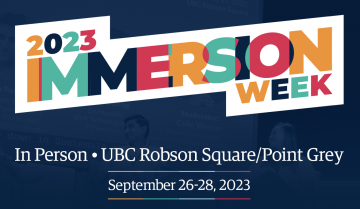
Title, Department, and Affiliations:
ATM Leadership Position: Community Representative on the ATM Education Council
Assistant Professor, Department of Medicine, Division of Medical Oncology, UBC
GI Medical Oncologist, BC Cancer
Colon Cancer Disease Site Co-Chair, Canadian Cancer Trials Group
Location: BC Cancer – Vancouver Centre
Tell us about your research and what makes you passionate about it.
Our research group focusses on identifying biomarkers and new treatments to personalize therapy for patients with gastrointestinal cancers. A major focus is on circulating tumor DNA (ctDNA) which can identify mutations from cancers cells in the blood of patients with cancer. ctDNA can be used to screen for cancer in patients without a known cancer, to identify patients at increased risk of having their cancer return after surgery or to personalize treatment for patients receiving systemic therapy.
Is there a translational aspect of your research that you are most excited about?
I get excited by the iterative process of moving from the bench to the bedside and back to the bench again. This allows me to interact with multidisciplinary teams of oncologists, surgeons, scientists, biostatisticians, bioinformaticians, trialists and patients as we try to identify new treatment approaches. If things don’t work, we move back to the lab and try to find out why so we can bring a better approach back to the clinic to evaluate. It let’s me interact with a diverse group of people at each stage of the journey and I’m continually learning new things.
Are there any initiatives you would like to see at UBC to accelerate translational medicine in your area of research?
We learn from and are inspired by the work of others. The pandemic amplified the separation between basic science, translational and clinical researchers. Efforts to cross-pollinate across streams of research and to integrate clinical research into The University of British Columbia will be helpful so that this cross pollination can occur now that research groups are returning to more in-person activities. The ATM is a great venue for this and I look forward to meeting new people through their activities.
You are part of the Academy of Translational Medicine Early Career Researcher cohort at UBC. What is the most important aspect of that community for you?
Community. We are often isolated from others outside of our department or division and may not know what others are doing. The opportunity to meet with others who are interested in translational research but have different ideas and techniques to address questions is invaluable.
Is there a resource that you found impactful and would recommend to others interested in translational medicine?
The “resources” section of the ATM website is a fantastic place to learn about core facilities available in the region.
How do you like to recharge outside of work?
The outdoors. Vancouver and the surrounding regions provide tremendous recreational opportunities to recharge your battery.
Is there anything else you’d like to add?
I’m always looking to meet new collaborators, so if there is anyone interested in working together, please reach out.







 The project, led by
The project, led by